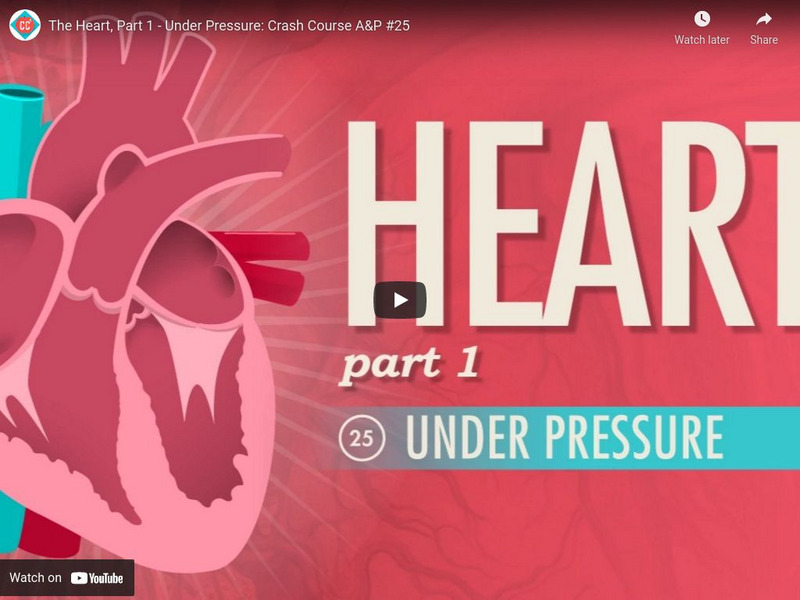Hi, what do you want to do?
Curated Video
Action Potentials and Contraction in Cardiac Muscle Cells
In this episode, I show how the Action potential is generated in cardiac muscle cells and how this results in Contraction of the Heart. When the action potential happens, calcium ions are released from the Sarcoplasmic reticulum, causing...
Curated Video
Regulating Stroke Volume, Skeletal Muscle Pump and Frank-Starling Mechanism
In this video, I talk about some of the things the body does to regulate stroke volume. I talk about the skeletal muscle pump and how that increases venous returns and about how the increased venous return results in a stronger...
Curated Video
Isovolumetric Contraction
In this video, I talk about the isovolumetric contraction of the ventricles. Once the signal travels to the ventricles, the ventricles contract. However, the valves remain closed until the pressure builds up high enough to open those...
Curated Video
The Anatomy Of The Heart
In this video, I go into the detailed anatomy of the human heart, from the four chambers to the valves to the major arteries and veins, the interatrial and interventricular septa to the lesser known chordae tendinae and papillary...
Curated Video
The Cardiac Cycle is SO EASY! Stop Making it Hard!
Are you struggling to understand the Cardiac Cycle? Well, struggle no more. In this video, I walk you through the entire thing, but instead of making it complicated, we make it simple (and easy to understand).
Kenhub
Parts of the brain: Learn with diagrams and quizzes
Learn how to identify the main parts of the brain with labeling worksheets and quizzes.
Visual Learning Systems
Investigating Circulation: the Amazing Heart
Colorful animations and crisp video footage illustrate the vital process of circulation. The major characteristics and features of the circulatory systems are explored, with special emphasis placed on circulatory problems and caring for...
Catalyst University
The Glymphatic System EXPLAINED [+ Review of CSF Flow]
In this video, we discuss the basics of the glymphatic system and review the flow of cerebrospinal fluid (CSF) through the brain.
The Noted Anatomist
The ventricular system
This video tutorial discusses the ventricular system of the brain including cerebrospinal fluid (CSF) production, flow, drainage and function. 0:00. Intro to ventricles 0:36. Lateral ventricles 1:13. Interventricular foramen (of Monroe)...
FuseSchool
Heartbeat and Pulse
Ever wonder what causes the thump-thump sound of your heartbeat? It’s all to do with the valves. The sound of your heart beating can be attributed to your valves closing, and always in specific pairs. Separating the atria from the...
Professor Dave Explains
The Circulatory System Part 1: The Heart
The heart! What a symbol of love and affection. But does emotional processing really take place in the heart? Sorry romantics, but no. That's the brain's business. But the heart is still miraculous. It is a completely natural pump whose...
Catalyst University
Anatomy - Major Parts of the Brain [Midsagittal View]
In this video, we look some of the major parts of the human brain from a midsagittal view.
Curated OER
The Circulatory System
Compare a variety of animals' circulatory systems to the human circulatory system. Paul Andersen uses his SMART Board to show the differences between two, three, and four chamber hearts, focusing on the human heart.
Khan Academy
Circulatory System and the Heart, Human Anatomy and Physiology, Health and Medicine
Watch as the Khan Academy explains why red blood cells are efficient carriers of hemoglobin and explains the difference between pulmonary arteries and veins. This thorough video, complete with excellent explanations and diagrams, will...
Howard Hughes Medical Institute
Heart Function
The left and right side of the heart must work together flawlessly—that's a lot to coordinate! An animation video shows the operation of each ventricle of the heart and then shows the two parts coming together to complete the loop of...
PBS
Pbs Learning Media: Crash Course Anatomy and Physiology: The Heart, Part 1: Under Pressure
Your heart gets a lot of attention from poets, songwriters, and storytellers, but today we'll learn how it really works. The heart's ventricles, atria, and valves create a pump that maintains both high and low pressure to circulate blood...
Crash Course
Crash Course A&p #25: The Heart, Part 1 Under Pressure
Your heart gets a lot of attention from poets, songwriters, and storytellers, but today Hank's gonna tell you how it really works. The heart's ventricles, atria, and valves create a pump that maintains both high and low pressure to...
Khan Academy
Khan Academy: Ventricular Tachycardia (Vtach)
This video explains ventricular tachycardia (V-tach) and its symptoms. [7:42]
Khan Academy
Khan Academy: What Is Shock?
This video explains the basics of shock and the four different types. [7:14]












